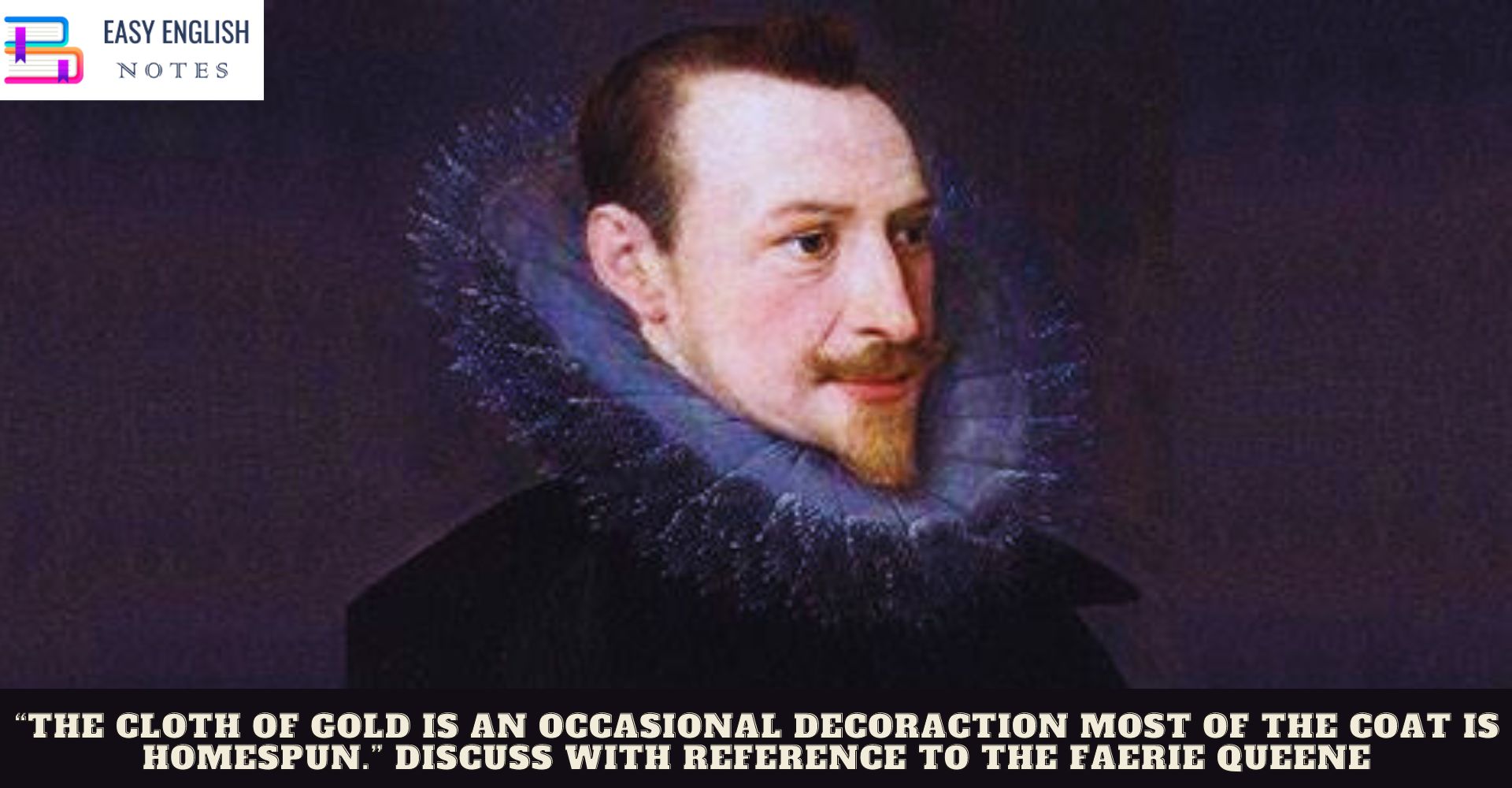“The cloth of gold is an occasional decoraction most of the coat is homespun.” with reference to The Faerie Queene:
The quotation seems to suggest that the splendor of colour in which The Faerie Queene is dressed up is more or less extrinsic and alien the real stuff is native. The poem is affiliated to the medieval cycle of romances in which knights fight the dragons and monsters, and the dragons and monsters are but symbolical of evil powers. There is, thus, the element of allegory in medieval romances. The light of the Renaissance flashes across the poem: and it seems to owe all its brilliance to Renaissance culture, but Spenser seems to stand closer to the Middle Ages in bringing in the traditional figures and the contest between good and evil, as we find in the romances of chivalry. He declares his aim – “Fierce warres and faithful loves shall moralize my song.”
But he seems to have little altered the essential character of these medieval romances, crude and unregenerate as they often are in their concept and content. He has simply adapted them to illustrate the virtues, that have been suggested to him by Aristotle, and Aristotle was a philosopher who was much exploited by Schoolmen for the solution of questions of morality and the theology, later to be replaced by Plato. Of course, the influence of Plato, who seemed to have come to his own with the Revival of Learning. Had his influence upon Spenser particularly in the four Hymns that he wrote, and also incidentally in The Faerie Queene.
The discipline that the Redcross knight is made to go through for his purification, including even penance in sackcloth and ashes, is based upon the fundamental doctrine and teaching of Christianity and there seems to be hardly any difference in what it was in the Middle Ages. Renaissance culture with all its colour and brilliance seems to be then a superimposition. “Most of the coat is homespun.” It is the native material- the ideas and conception (relating to Chivalry and Christianity), ingrained in the Saxon race, which form the groundwork of The Faerie Queene, Renaissance culture and all the light is shed, do not seem to absorb and transform the native stuff. This is all that the quotation will mean.
Also Read :
- Compare Hamlet with Macbeth, Othello and other Tragedies
- “The Pardoner’s Tale” is the finest tale of Chaucer
- Prologue to Canterbury Tales – (Short Ques & Ans)
- Confessional Poetry – Definition & meaning
It should be pointed out that it is rather an extreme view. In form The Faerie Queene is a blend of medieval romance and medieval allegory. But it transcends its original limits and the allegory or the moral purpose; and even the knightly deeds and the virtue, which they embody, are forgotten, and the reader is led from one panoramic scene to another, and it is all a vision of beauty be it the portraying of a human character (such as Una), or the sketch of a landscape. The passionate love of beauty. Both physical and spiritual. Is the e;ift of the Renaissance.
The Faerie Queene is saturated with the spirit of the Renaissance, and medieval allegory and medieval romances seem to be but an intrusion J. A. Hammerton has the right judgment: “Edmund Spenser stood at the literary parting of the ways, for he lived at a time when the culture of the Renaissance and the new national aspirations to which the Reformation had given birth in England, were rapidly gathering strength, but when the memory of the Middle Ages was still strong.
His masterpiece, The Faerie Queene, amply illustrates his position. In form it is an old medieval allegory, symbolic from beginning to end: the Knight of the Redcross, the distressed damsel Una, the Seven Deadly Sins, the Blatant Beast, all are the stock characters of medieval fiction, but the poem is so filled with the new ideas of the Renaissance, with the idea’s and national spirit of the English Reformation that had Spenser not stressed the underlying meaning of the allegory in his canto-headings and dedication, it might well have been overlooked…… He was the first to apply conscious artistry and a hitherto undiscovered wealth of culture to the development of English Verse, the first to produce an epic on the plane of national exaltation, and his followers discarded the lingering traces of medievalism and concentrated on the new and vital qualities inherent in everything that Spenser wrote.”
PLEASE HELP ME TO REACH 1000 SUBSCRIBER ON MY COOKING YT CHANNEL (CLICK HERE)











